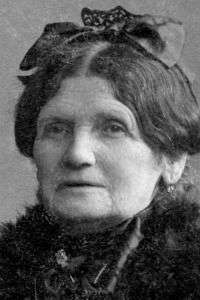Pauline Wengeroff
Pauline Wengeroff (born as Pessele Epstein) (1833–1916) is the author of a two-volume memoir chronicling her experience of Jewish Modernity in Russia in the late 19th century. She was the mother of Semyon Vengerov and Isabelle Vengerova.

She was born in 1833 in Bobrujsk, Belorussia (currently Belarus), and grew up in Brest-Litovsk, in Minsk. The book, Memoiren einer Grossmutter, Bilder aus der Kulturgeschichte der Juden Russlands im 19 Jahrhundert (Memoirs of a Grandmother: Scenes from the Cultural History of the Jews of Russia in the Nineteenth Century), was originally published in Yiddish by a German press in 1910.[1]
Her husband, Chonon (Afanаsy) Wengeroff was director of the Commercial Bank in Minsk and served the City Council from 1880 to 1892. Wengeroff and her husband founded vocational schools for poor Jewish children in Minsk.
Writing
Wengeroff's memoirs are critical of the loss of women's power and family values in the modern Jewish family leading to the loss of Jewish culture as a whole. She was critical of the era of the Haskalah movement (Jewish intellectual and social enlightenment). Wengeroff drew inspiration from her struggles to maintain in Jewish family life in the face of her husband and children's ultimate rejection of Judaism.
Jewish cultural leaders Gustav Karpeles, a Jewish literary historian, Theodor Zlocisti, a German Zionist pioneer, and Solomon Schechter, President of the Jewish Theological Seminary of America praised the memoir.[2]
Wengeroff's work first appeared in English in Lucy Dawidowicz's translation of several discontinuous excerpts from Volume 2 in The Golden Tradition: Jewish Life and Thought in Eastern Europe. New York: 1976. Memoirs of a Grandmother, was translated into English by Shulamit S. Magnus in 2010.[3]
Wengeroff also published stories of her life in Voshkhod, a major Russian-language Jewish periodical at the time.
Awards
- 2010: National Jewish Book Award in the Women's Studies category for Memoirs of a Grandmother: Scenes from the Cultural History of the Jews of Russia in the Nineteenth Century, Volume One[4]
References
- Magnus, Shulamit S. "Pauline Wengeroff 1833-1916." Jewish Women's Archive.
- Magnus, Shulamit S. "Wengeroff, Pauline." in YIVO Encyclopedia of Jews in Eastern Europe.
- Wengeroff, Pauline, and Shulamit S. Magnus. 2010. Memoirs of a grandmother scenes from the cultural history of the Jews of Russia in the nineteenth century. Stanford, Calif: Stanford University Press.
- "Past Winners". Jewish Book Council. Retrieved 2020-01-25.
Bibliography
- Magnus, Shulamit S. "Pauline Wengeroff and the Voice of Jewish Modernity." In Gender and Judaism. New York and London: 1995, 181–190.
- Idem. "Kol Isha: Women and Pauline Wengeroff's Writing of an Age." Nashim 7 (2004): 28–64.
- Idem. "Sins of Youth, Guilt of a Grandmother: M. L. Lilienblum, Pauline Wengeroff, and the Telling of Jewish Modernity in Eastern Europe." Polin: Studies in Polish Jewry 18 (forthcoming).
- Wengeroff, Pauline. Memoiren einer Grossmutter: Bilder aus der Kulturgeschichte der Juden Russlands im 19 Jahrhundert. Vol. 1, Berlin: 1908; republished with Vol. 2, 1910; 1913; 1919; 1922.
- Louis Greenberg. The Jews in Russia, the Struggle for Emancipation, vol. 1: 62. New York: 1976.
- Shaul Ginsburg. Historishe verk, vol. 2: 82–90. New York: 1937
- Sinai Leichter. "Zichronoteha shel savta minskait Paulina Wengeroff." In Minsk, Ir va-Em, edited by Shlomo Even-Shoshan